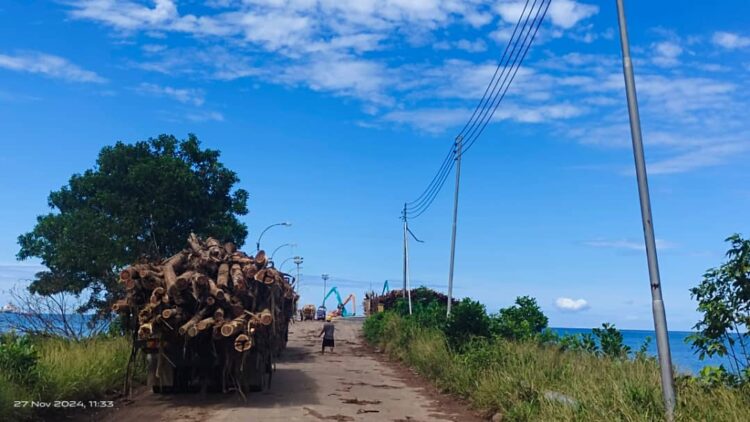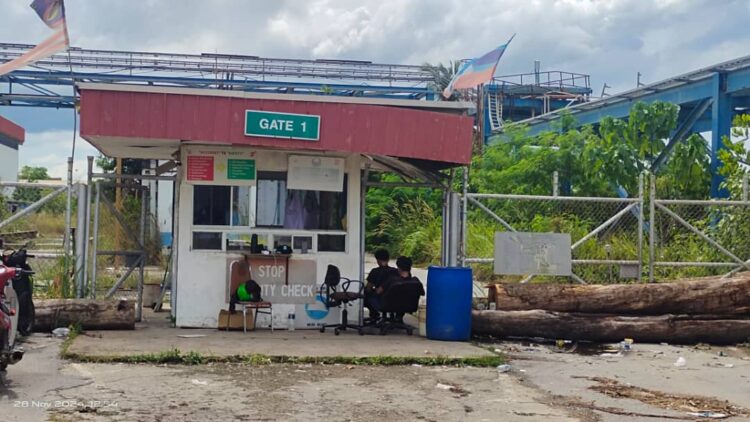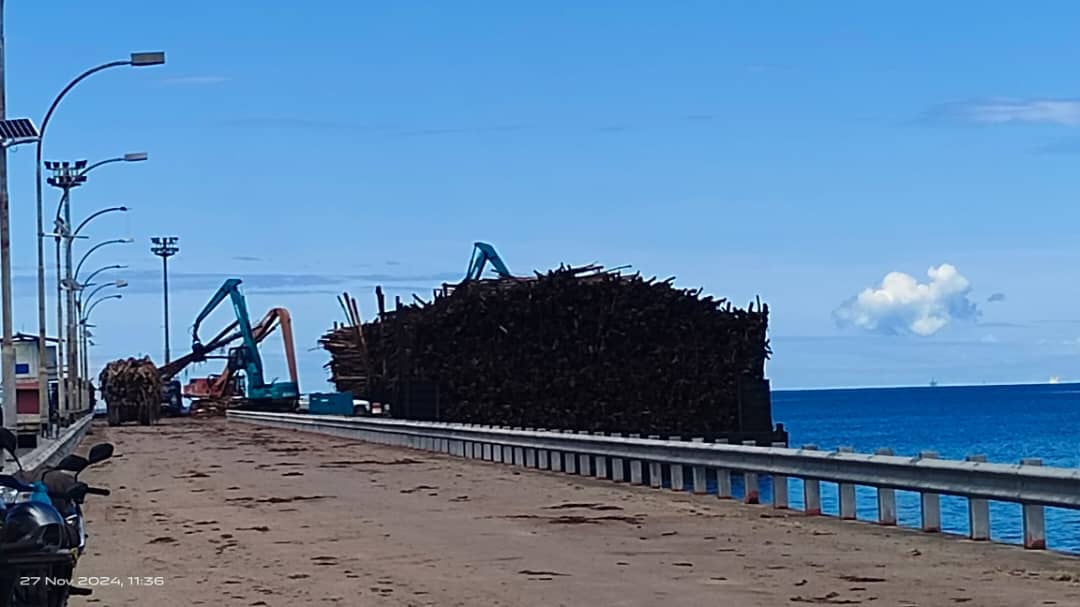The Sabah Forestry Department has issued a furious press statement claiming as “false” Sarawak Report’s article detailing how logs have continued to be extracted from the Sabah Forest Industries (SFI) licence area, despite a court order that this should immediately cease on November 8th.
Yet, in the very same statement attacking Sarawak Report, the Conservator of Forests acknowledges that timber IS STILL BEING EXTRACTED, giving the excuse that they are merely removing ‘diseased’ Acacia trees infected with Ceratocystis manginecans fungus.
“The timbers extracted from the area are all plantation Acacia trees planted in the ex-SFI area (the former titled land) and are being removed and destroyed because they either dead or infected with Ceratocystis fungus.“
Therefore, by their own admission, the report was in fact correct. Whether there is a viable excuse is a separate matter which raises immediate questions, the first being did the state government raise this matter of infectious fungus with the court at the time they were ordered to cease activities within the licence area and thereby seek an exemption to remove the ‘diseased trees’?
If not, why not and does that not mean exactly what we reported which is that they are illegally logging the area in defiance of a court order?

The second question is what consultation and information have they provided for the local people and indeed the receivers who are managing the area about this problem of disease control?
The press release complains that SFI had not informed the state government (which seized the land in 2021) that trees were diseased. Yet, what action has the state government itself taken to alert interested parties following their own discovery?
Sarawak Report has made its own enquiries as to the above and we have been informed that the first the plaintiffs who gained the court order on behalf of SFI heard about these “diseased trees” was AFTER the state government and its allies lost in court and were ordered to stop logging on November 8th!
“The first time SFI heard about this allegation of diseased trees was in a parliamentary answer on behalf of the chief minister on November 20th AFTER the court order to cease activities. There has been nothing from any biologist, nothing from the state forestry department, no report concluded or customs declaration” one person informed by the plaintiffs has told Sarawak Report.
Till this day, the informant has confirmed, there has been no information provided about this alleged disease and it certainly was not brought before the court in an application to except the alleged diseased area from logging.
Indeed, we can now inform that SFI will be lodging an affidavit to the court to protest at the violation of the court order to cease logging.
So, shame on the Sabah Forestry Department for coming out with such an attack against correct reporting when its own actions appear so severely lacking!
The concern does not stop there. The photographs received by Sarawak Report of the activities last Friday November 21st clearly show logs being trucked OUT OF THE area and then loaded onto barges for shipment. All on the excuse, we learn, that this timber is ‘diseased’!
Indeed, the forestry department’s own press statement again ADMITS this exportation of diseased timber, boasting that the state coffers have thereby benefitted from export taxes.
“The State Government (via Sabah Forestry Department) has already collected a export and other royalties through Yayasan Sabah’s efforts.”
Why is Sabah forestry department boasting about exporting what we now learn at their own admission are diseased logs?
If these trees have been cut because they are diseased, as claimed, ought they not be destroyed on site to prevent a spread of this contagious condition?
Our information is that the advertised destination for these logs is Bintulu in neighbouring Sarawak, where Yayasan have a contract to supply fuel to the Press Metal aluminium smelter plant.
If so, where is the quarantine and the correct procedure to prevent the spread of this disease to Sarawak?
Given the apparent state of affairs, the people of Sabah, Sarawak and indeed well beyond are also owed an answer to a widespread suspicion that the transported logs (which actually look to be a tall and healthy size) could be sold on at a higher grading than mere charcoal production.
If that is the case, what assurance can be provided that these ‘diseased’ logs are not being exported on to other countries for other purposes …. disease and all?
Therefore, rather than attacking Sarawak Report and claiming the article is “completely false and without basis” the Sabah state government should clearly and with urgency lay out the exact details as to what infected wood has gone where and since when.
“Lost Jobs and Homes”
The statement equally attacks Sarawak Report for suggesting the state government has failed to properly take care of the SFI worker who lost their employment on lands they seized. Some 2,000 workers used to live in Sipitang along with their families – a community of 6,000, say local campaigners for the rights of these people.
Last year, in a parliamentary interchange, the chief minister is on record telling the opposition leader that the state had tired of funding these workers’ salaries and that these former employees had to start to take care of themselves.
So, why is it ‘false’ to state, as we did in our article, “the dependent communities of former staff have been cut off from financial support”?
Equally, why is it ‘false‘ to say they continue to be deprived of electricity and water which the state government have cut off from the settlement?

Sarawak Report asked local spokespeople whether salaries and services have been returned to the diminished number of hard core poor who struggle to continue to live in the settlement and we have been told they have not.
Indeed, the SFI receivers did attempt to fund a reconnection with SESB and agreed terms. However, the state government refused to allow the reconnection. Last year the same Sabah state government attempted to carry out an eviction order on these remaining families, only to retreat in the face of public protest.
It is clear, say activists, that the the purpose for cruelly withholding services is to try and drive these people away by other means.
Again, the state government statement admits all of the above by boasting that Yayasan Sabah has:
“re-appointed 198 ex-SFI employees to work with them, who initially lost their jobs and homes.”
The statement then laughably claims this “again contradicts the Sarawak Reports assertion that the land acquisition has taken away jobs from ex-SFI workers“, when in fact it is an admission!
As anyone can read, the above statement CONFIRMS that these people had lost their jobs and homes. What it unfortunately fails to acknowledge is that 198 re-appointments is just a fraction of the jobs lost – people and their dependants who are no longer receiving paid employment or able to live in homes without access to water.
Local activists say they believe the job figure boasted of is actually far greater than the number currently employed.
So, instead of beating the messenger, Sabah forestry department should look to its actions and provide due transparency. Few believe that Yayasan has only logged out 2,000 ha, as claimed, since laying hands on the area in 2022. So, they should unlock the gates and allow proper access to the region for doubters to check and, moreover, provide a full report on the recently disclosed fungus that they are now using as their excuse for ignoring a court order to vacate the area.
As Sarawak Report has previously reported, a well known West Malaysian billionaire businessman, Syed Mokhtar, had originally agreed to pay SFI’s receivers a market price of RM1.2 billion for the licensed area and had put down 10%.
Yet, after the new GRS government took office, these pledges were withdrawn as new strategies came into play. The first move was for the state government to compulsorily acquire the forest concession instead ‘for a public purpose’, which appeared to be to hand it to Mr Mokhtar without having to pay the market price after all. Indeed, the ‘settlement’ offered instead was RM256 million, little more than the tenth already paid.
SFI’s receivers have contested that Mr Mokhtar is not a ‘public purpose’ and that the confiscation order has the appearance of seeking to abuse state power to grant a crony businessman for free what he had originally agreed to pay for – something that looks remarkably like a form of authorised theft.
It is on this basis of this argument the stay has been ordered until there is a judicial review of the state government’s actions in this case.
The state government meanwhile, in an answer to another parliamentary question has now said it is NOT giving the license to Syed Mokhtar after all. Rather, as the latest press statement confirms, the future exploitation of the area is planned to take place by Yayasan and “its private sector partners”.
Three private companies have so far been disclosed by the state government in this respect. Sources have told Sarawak Report that all three are owned by one to two dollar companies set up in West Malaysia by entities under the control of none other than Syed Mokhtar!
So, little progress there?
This is a matter that is now due for decision by the courts who have ordered activities cease until such time. Why blame Sarawak Report for reporting it?
update: 4th December:
Yayasan/company workers manning the loading jetty and gate houses into the logging area rejected a copy of the sealed court order requiring operations cease that was presented to them, claiming it was ‘not valid’.
They also claimed the other party had misunderstood the court order that clearly instructs that operations must cease.
One local activist told Sarawak Report “They also said that if we want them to vacate the entire SFI area, we need to meet with the state government because they will only follow the state government’s instructions. This implies that the law in Malaysia is now truly disregarded”.
So it seems, as we pointed out in our previous article, the state government appears to consider itself above the laws it is tasked to enforce on others.
Sabah forestry department statement:
FOR IMMEDIATE RELEASE
False Claim on ex-SFI Concession Area by SarawakReport
2nd December 2024, SANDAKAN – Following the report released by SarawakReport yesterday [1st December 2024] entitled “Illegal Logging in Sabah! (By the State Government)” the Sabah State Government, through its own Statement today denying the whole report and found it to be deliberately false and misleading.
On September 1, 2021, the Sabah Government cancelled the SFI timber concession due to the company’s financial failure and cessation of operations -SFI under the receivership of Grant Thornto Consulting Malaysia Sdn Bhd ceased operations in 2016.
The revocation of the licence was made in the public interest, and SFI was subsequently wound-up by its creditors, including Sabah Development Bank Bhd., in November 2021 on the grounds that it was unable to pay its debts.
The Sabah Government later compulsorily acquired 15 plots of land amounting to approximately 12,000 hectares from the insolvent SFI under the “Sustainable Forest Resource Utilization, Processing, Management, Conservation Research, and Development Scheme, District of Sipitang” (the ‘Public Interest Scheme’). The acquisition process was completed in August 2022.
Yayasan Sabah group was then appointed to implement the Public Purpose Scheme with the assistance of the Sabah Forest Department. This strategic initiative aims to conduct forest timber research and development, to sustainably manage, develop, and replant and sustainable exploit native forests, forest plantations, and timber resources within the Sipitang District, and to focus on reforestation and the manufacture of value-added timber products.
Prior to the State Government’s acquisition and while the acquired lands were under the care of SFI / Grant Thornton, the Acacia Mangium tress became infected with Ceratocystis manginecans fungus. This was not previously disclosed by Grant Thornton and was discovered by the Sabah Forest Department.
The timbers extracted from the area are all plantation Acacia trees planted in the ex-SFI area (the former titled land) and are being removed and destroyed because they either dead or infected with Ceratocystis fungus.
Permission to log and extract these dead or infected Acacia trees was given to Yayasan Sabah (YS), whereby tree harvesting process needs to be expedited to remove those plants infected with the Ceratocystis fungus. This must be carried out immediately to prevent the spread of infection in other areas, and to allow planting of new trees to be carried out subsequently. These new trees, among others will be studues as part of the research and development part of the Public Purpose Scheme.
As of to date, logging has been carried out in an area of approximately 2,039 hectares and Yayasan Sabah will carry out replanting in the area with a planting cost of approximately RM12,000 per hectare.
The Sarawak Report’s allegation that ‘… timbers were flushed out without paying the proper dues, and in the process, the dependent communities of former staff have been cut off from financial support” is completely false and without basis.
The State Government (via Sabah Forestry Department) has already collected a export and other royalties through Yayasan Sabah’s efforts. Apart from that, Yayasan Sabah has also re-appointed 198 ex-SFI employees to work with them, who initially lost their jobs and homes. This again contradicts the Sarawak Reports assertion that the land acquisition has taken away jobs from ex-SFI workers.
The State Government is also pleased to announce significant progress in the implementation of the “Sustainable Forest Resource Utilization, Processing, Management, Conservation Research, and Development Scheme”, following following investment commitments estimated at RM4 billion over the next 10 years through Yayasan Sabah and its private sector partners.
This will include research and development of hybrid Acacia and other fast-growing, disease-resistant natural forest (NF) and plantation timber (ITP) species. In addition, the scheme also seeks to support local community by creating job opportunities through the sustainable downstream exploitation of NF and ITP timber for the people of Sipitang and is expected to generate up to 3,000 job opportunities for the Sipitang District, revitalizing and strengthening the local economy.
This project aligns with the Sabah State Government’s policy to develop 400,000 hectares of statewide Industrial Tree Plantation (ITP) areas within the next decade, focusing on high-value wood products for export and technology transfer to the people of Sabah.
### End of Press Release
Chief Conservator of Forests,
Sabah Forestry Department

